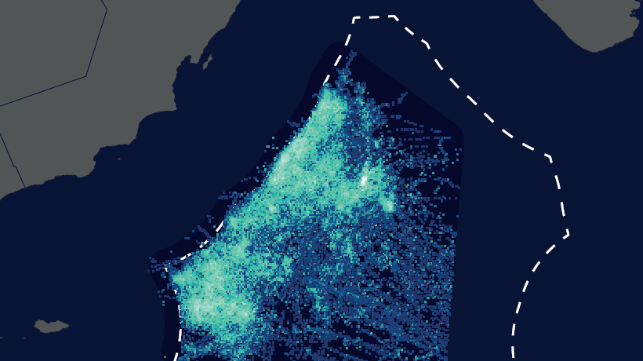Report: China's Squid Fishing Fleet Has Discovered the Indian Ocean

A new report from the World Wildlife Fund and shipping data firm Trygg Mat Tracking shows that unregulated fishing on the high seas of the Indian Ocean is on the rise. The Indian Ocean accounts for over 14 percent of global wild-caught fish, and commercial fishing data shows that 30 percent of the assessed stocks in the region are already overfished. The new WWF report shows that unregulated fishing, which is not factored into the 30 percent calculation, is increasing in intensity.
As an example, squid fishing off the coast of Oman grew by 830 percent in just five years, from 30 vessels in 2015 to nearly 280 at the end of 2019. All vessels that WWF and TMT have identified in this fishery are either confirmed or likely Chinese-flagged fishing vessels, based on AIS identifiers and movements. The analysis of AIS data indicates that the catch is transhipped at sea to reefer vessels, as commonly seen in Chinese distant-water squid operations in the Eastern Pacific and the South Atlantic.
“The regulatory gaps in the high seas of the Indian Ocean have not gone unnoticed by international fishing fleets. As global demand for seafood continues to rise, it is imperative that these gaps are closed, or else we face destabilising both marine ecosystems and the marine resources that many people depend on for income and food security," said Duncan Copeland, Executive Director at TMT.

that matters most
Get the latest maritime news delivered to your inbox daily.
Indian Ocean fisheries are a major source of cuttlefish and squid exports to developed nations. A portion of the unregulated catch likely ends up in this supply chain, and WWF and TMT are calling on policymakers to adopt new measures to prevent its entry into market. According to WWF, the rapid escalation of unregulated squid fishing poses a threat not only to the squid, but also to the food web: squid are a major food source for tuna.
"Failing to sustainably manage fisheries furthers overfishing, an already rampant problem around the world. The current regulatory vacuum in the Indian Ocean cannot continue," said Dr Antonia Leroy, Head of Ocean Policy at WWF's European Policy Office. "As the world's top seafood market, the EU must adopt and enforce ambitious traceability measures to prevent unsustainable products from entering the market. These actions will secure the livelihoods of honest fishers, bring credibility to seafood products consumed in the EU and secure the health of our ocean.”
